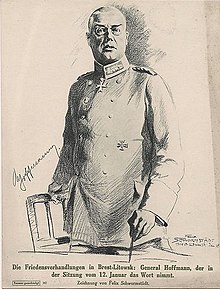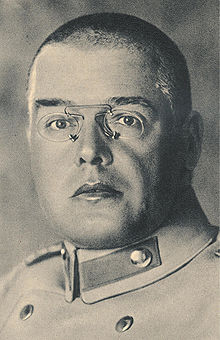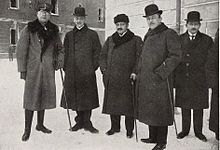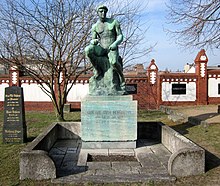Max Hoffmann
Max Hoffmann , actually Carl Adolf Maximilian Hoffmann (born January 25, 1869 in Homberg (Efze) , † July 8, 1927 in Bad Reichenhall ) was a German general who played an important military and political role in the First World War . After the war he developed the "Hoffmann Plan" to overthrow the Soviet Union .

Life
Max Hoffmann grew up in Homberg as the son of the district judge Julius Hoffmann and his wife Friederike Charlotte Alwine Hoffmann, née du Buisson. From 1879 to 1887 he attended high school in Nordhausen . After graduating from high school, he was a three-year-old volunteer musketeer and avantageur in the 4th Thuringian Infantry Regiment No. 72 in Torgau . From October 1, 1887 to July 5, 1888 he was a portepee ensign at the Royal War School in Neisse . On August 16, 1888, he received his officer license with "imperial commendation" and became second lieutenant . From 1895 to 1898 he studied as a prime lieutenant at the Prussian War Academy and then spent half a year as a military attaché at the Tsar's court in Saint Petersburg . From 1899 to 1901 Hoffmann worked in the Russia Department of the German General Staff and became a specialist in Russian affairs. In 1901 he was promoted to captain and remained permanently in the Russian department of the General Staff under Alfred von Schlieffen .
In the Russo-Japanese War 1904/05, Hoffmann was a German military observer in the 1st Army of the Japanese Army in Manchuria . When a Japanese general prevented him from observing a battle from a hill, Hoffmann yelled at him in the presence of foreign ambassadors and correspondents with the words: “You are a yellow man; if you don't let me up there, you're not a civilized person! ”In 1907 Hoffmann was promoted to major . He was commissioned to work out the prospective Russian campaign plan in a possible war against Germany. Barbara Tuchman describes Hoffmann as
“ Tall and strong, had a mighty round skull and a short Prussian haircut that looked like a bald head. ... although he was a bad rider and an even worse fencer, as well as a strong eater and drinker, he was quick to think and quick to judge. He was a kind, happy, and clever person who had no respect for anyone. "
In March 1913 he was promoted to lieutenant colonel after he had already been appointed head of the ministerial department in the Prussian war ministry . In the summer of 1914 he was appointed deputy commander of the 4th Baden Infantry Regiment "Prinz Wilhelm" No. 112 , because the use of troops was a prerequisite for further promotion. This brief interlude ended the mobilization on August 2, 1914, which made him First General Staff Officer of the newly formed 8th Army .
First World War
As head of the operations department, Hoffmann saw himself as the actual commander in chief of the 8th Army, which was responsible for the defense of East and West Prussia , due to the inability of Commander-in-Chief Maximilian von Prittwitz and Gaffron and the convalescence of Deputy Georg von Waldersee . Hoffmann worked out the operational plans for the battles near Gumbinnen , Tannenberg and the Masurian Lakes . After the surprising replacement of Prittwitz, who after Gumbinnen wanted to withdraw the 8th Army behind the Vistula against Hoffmann's resistance , he was replaced by Chief of Staff Moltke by the reactivated Paul von Hindenburg , to whom Erich Ludendorff was assigned as Chief of Staff. Hoffmann was very familiar with the region and subsequently served Ludendorff as a source of ideas, whom he knew well from Posen and Berlin, where they had lived in the same house. Both claimed authorship for naming the Tannenberg Battle. In his memoirs, Hoffmann contradicts the view that the battle was planned by Ludendorff.
The Hindenburg-Ludendorff-Hoffmann trio achieved great military successes on the Eastern Front thanks to Hoffmann's tactical skills. Nevertheless, the promises of the "military duo" Hindenburg-Ludendorff for a decisive victory against Russia could not be fulfilled. Hoffmann recognized: “The Russian army cannot be completely overthrown, we could only do that if we only waged war with Russia alone.” However, Hoffmann viewed Hindenburg very critically: “The fellow is too sad a comrade, this great general and Idol of the people ... A man has never become famous with so little mental and physical exertion ”. These derogatory remarks were gently suppressed when his notes were published in 1929. When Hindenburg and Ludendorff after the replacement of Falkenhayn 1916, the leadership of the Supreme Command took over (OHL) and the Western Front turned towards Colonel was Hoffmann, in October 1917 to Major General conveyed to the Chief of Staff to the Chief in the East , Prince Leopold of Bavaria appointed .
Brest-Litovsk
As Chief of Staff Upper East, Hoffmann was the observer of the OHL at the peace negotiations in Brest-Litovsk in late 1917 / early 1918. As Chief of the General Staff on the Eastern Front , he was the initiator and host of the peace conference. Although he had no power to negotiate, he was able to exert a great influence on what happened. On December 26, 1917, he explained to Joffé, head of the Russian delegation :
"There are no violent annexations if the Central Powers determine the fate of Poland , Lithuania and Courland to the exclusion of the Russian state in agreement with the responsible political representatives in these areas, which have already declared their withdrawal from the Russian state association."
Rather, he wanted to gain a German sphere of influence in Eastern Europe by fragmenting western Russia. Hoffmann wanted this “questionable overstretching” of the “ right of peoples to self-determination ” to be understood as a “means of detaching the peoples from Russia”. At the end of May 1917, in keeping with the “hairdressing policy” of Reich Chancellor Bethmann Hollweg (indirect control to avoid open annexations) , he had already suggested that Hindenburg should officially forego annexations, but that Germany should design the areas to be released from its state association by Russia regulate.
When negotiations stalled because of the German demands and Ottokar Czernin threatened a separate Austro-Hungarian peace , Hoffmann replied that he found the "idea brilliant" because it would allow him to pull 25 divisions out of the Austrian front.

On January 12, 1918, according to Czernin, Hoffmann, apparently on the orders of the OHL, gave an "extremely sharp speech in Brest, in which he shouted the position of power of the victorious German army into the world and declared that an evacuation of the occupied territories was forever impossible" . He declared that "the victorious German army is in your area", the OHL forbids any interference in the affairs of the occupied territories. This occurrence soon became famous in Germany as a (verbal) “punch” or was referred to as “hit the table” on Ludendorff's direct command.
"Hoffmann himself never fully understood the effect that emanated from his speech." According to his own statement, he did not hit the table with his fist, but only pointed out to Trotsky contradictions in his attitude. Although he had shown more sense of proportion and political understanding than Ludendorff in Brest, his tough negotiations became proverbial. The “triumphant language of the victor”, the “violent policy of the Central Powers” in contrast to their “lip service to peace” ultimately provided the Bolsheviks with welcome propaganda material and had direct effects on the January strike in Germany and the January strike in Austria-Hungary.
Further war aims and disempowerment

He also supported Ludendorff's more far- reaching war goals - Hoffmann already referred to the Crimea as the “German Riviera”: The Crimea was to become a permanently occupied colonial state with German settlement, as a naval base important for German influence in the Caucasus and the Middle East . Nevertheless, Hoffmann was one of the few German generals who represented moderate war aims, especially with regard to Belgium and the “Polish border strip”.
In contrast to the OHL, Hoffmann decidedly refused to annex large areas of Russian Poland ("Polish border strips") by the German Reich:
“To annex a broad border strip with almost two million Poles to Germany, as the Supreme Army Command demanded, in my opinion this could only result in disadvantages for the Reich. I thought the so-called "Germano-Polish solution" was even worse. "
At the beginning of January 1918 Hoffmann succeeded in obtaining the approval of Kaiser Wilhelm , who considered him to be the greatest expert in Eastern issues, to a greatly reduced “Polish border strip”, in which the increase in the Polish population would only have been around 100,000. But in the Privy Council on January 2, 1918, the emperor had to back down again from the OHL and withdraw the proposal. This led to the final break between Hoffmann and Ludendorff, who, together with Hindenburg, threatened to resign on January 4th and unsuccessfully demanded that Hoffmann be recalled.
Ludendorff then initiated a reputation-damaging press campaign against Hoffmann, which held him weak. He is an "agent of Kühlmann " and his wife is a liberal with connections to "Jewish circles". The Kaiser gave in under public pressure and Hoffmann was largely sidelined politically for further war events on the Eastern Front. The conquest of the areas required in Brest in Operation Faustschlag from February 18, 1918 onwards was for Hoffmann just a military “ride” by train and car. According to Hoffmann, the troops required for this did not leave the Western Front during the German spring offensive in 1918 , because they could no longer have been used offensively there against the power of the Western powers. After the armistice at the end of 1918 , Hoffmann took care of the repatriation of the German Eastern Army.
Hoffmann plan
Max Hoffmann was the intellectual originator of the "Hoffmann Plan" first formulated in 1922. Together with the industrialist Arnold Rechberg , he planned an anti-Soviet campaign. Germany should intervene in Soviet Russia together with Great Britain and France . One must overthrow the Soviet government through "joint military intervention, replace it with a constitutional Russian government and restore Russia economically".
In 1926 and 1927, meetings were held in London under the leadership of the Dutch industrialist Henri Deterding , during which the plan and its implementation were vigorously discussed. Henri Detering financially supported the possible execution by allocating money to Max Hoffmann. However , Hoffmann's plans did not find any echo in the leadership of the Reichswehr , at that time the focus was rather on cooperation with the Soviet Union in the military field.
At the end of his 1925 book At All End Moscow , he wrote about the goal of the campaign , about the “final result” of his considerations:
“The more the European great powers get involved in the never really ending colonial wars sparked by Moscow and exhaust themselves in it instead of marching on the headquarters - on Moscow - the more they do what the Moscow Soviet government wants. The further European exhaustion progresses, because European military power is frittered away and wiped out in colonial wars, because at the same time the markets in Asia and Africa are dwindling as a result of these colonial wars and because as a result the economic hardship in Europe increases, the more difficult the really decisive campaign gradually becomes Moscow. If, on the other hand, the headquarters in Moscow are broken up in good time, then the uprisings of the colonial peoples against the Europeans will collapse without central management. In addition, Bolshevism will lose all prestige among Asians and Africans as soon as Europe comes to the decision to take Moscow, the stronghold of the Asian rulers. "
In the 1920s, Hoffmann and Rechberg were involved in an affair involving counterfeiting of Russian Chervonetz coins, which were used to undermine the Soviet currency. However, Rechberg was acquitted in 1930.
Weimar Republic
From 1919 to 1927 Hoffmann lived in Berlin and was married to the painter Corinna-Irena Hoffmann. In his book The War of Missed Opportunities , he settled accounts with Falkenhayn and Ludendorff, and described Hindenburg as incapable. Above all, he emphasized his own share in Tannenberg.
Hoffmann was buried in the Invalidenfriedhof in Berlin in 1927 . More than 90 percent of this was destroyed after the Wall was built in 1961 . One of the few properly relocated tombs was that of Max Hoffmann. His tomb was moved from Grabfeld E to Grabfeld C. The acquirer of the grave, Hoffmann's friend Arnold Rechberg , had paid for a lying right that lasted until 2100, also with the intention of being buried there, which was then prevented by the political events after 1945. The tomb, adorned with a bronze figure by Arnold Rechberg already exhibited under the title La resignation humaine in 1906 and cast by H. Noack in Berlin in 1927, was approved in 2002 by the Invalidenfriedhof association and the Berlin State Monument Office , which issued an expert opinion on the historical situation at the Berlin Sepulkral researcher Jörg Kuhn had been commissioned to be re-erected on the preserved historical area crypt. On the 2002 renewed back of the plastic bearing shell limestone blocks stand as Epithaph three battles: Tannenberg , Battle of the Masurian Lakes , Winter Battle of Elk and Augustow , including three locations: Stochod , Zlozcow , (places where in 1916 the Brusilov offensive to a halt was brought) and Riga (captured in September 1917). On the right side there is the inscription with a verse from the 1st book of the Chronicle : "and I have given you a name like the great names on earth". A portrait of Hoffmann by Corinna-Irena Hoffmann in Homberg's town hall commemorates him. He was made an honorary citizen of the city of Homberg an der Efze.
Fonts
- The War of Missed Opportunities. Verlag für Kulturpolitik , Munich 1923.
- Moscow at all ends. The problem of Bolshevism in its recent effects. Verlag für Kulturpolitik, Berlin 1925. Online
- Tannenberg as it really was. Verlag für Kulturpolitik, Berlin 1926.
- The notes of Major General Max Hoffmann. Edited by Karl Friedrich Nowak . Verlag für Kulturpolitik, Berlin 1929 (all published writings as well as posthumous publication of his diary and his field notes).
literature
- Thilo Vogelsang: Hoffmann, Max. In: New German Biography (NDB). Volume 9, Duncker & Humblot, Berlin 1972, ISBN 3-428-00190-7 , p. 401 f. ( Digitized version ).
- Vejas Gabriel Liulevicius : Land of War in the East. Conquest, colonization and military rule in the First World War 1914–1918. Translated from the American by Jürgen Bauer. Hamburger Edition , Hamburg 2002, ISBN 3-930908-81-6 .
- Wolfgang J. Mommsen : The Great Disaster in Germany. The First World War 1914–1918. ( Handbook of German History , Volume 17). 10th edition, Klett-Cotta, Stuttgart 2002, ISBN 3-608-60017-5 (contains an overview of sources and research).
Web links
- Newspaper article about Max Hoffmann in the 20th century press kit of the ZBW - Leibniz Information Center for Economics .
Individual evidence
- ^ Karl Friedrich Nowak (Ed.): The records of Major General Max Hoffmann . Verlag für Kulturpolitik, Berlin 1929, Volume 2, p. XXXV.
- ↑ a b c Spencer Tucker (Ed.): The Encyclopedia of World War I. A Political, Social and Military History. ABC-Clio Verlag, Santa Barbara 2005, ISBN 1-85109-420-2 , p. 555.
- ↑ a b c Barbara Tuchman : August 1914. Fischer Taschenbuch Verlag, Frankfurt am Main 1990, ISBN 3-596-24440-4 , pp. 75f.
- ↑ Barbara Tuchman: August 1914. Fischer Taschenbuch Verlag, Frankfurt am Main 1990, ISBN 3-596-24440-4 , pp. 288f.
- ↑ Barbara Tuchman: August 1914. Fischer Taschenbuch Verlag, Frankfurt am Main 1990, ISBN 3-596-24440-4 , p. 297ff.
- ↑ Max Hoffmann: Tannenberg as it really was. Verlag für Kulturpolitik, Berlin 1926, p. 312.
-
^ Karl Friedrich Nowak (Ed.): The records of Major General Max Hoffmann. Verlag für Kulturpolitik, Berlin 1929, Volume 2, S. 64.
Holger Afflerbach : The military planning of the German Reich in the First World War. In: Wolfgang Michalka (Ed.): The First World War. Effect - perception - analysis. Seehamer Verlag, Weyarn 1997, ISBN 3-932131-37-1 , pp. 280-318, here: pp. 290f.
Gerhard Paul Gross: In the shadow of war. The Eastern Front of the First World War in the years 1914 and 1915. In: Gerhard Paul Gross (Hrsg.): The forgotten front. The East 1914/15. Event, effect, aftermath. (= Age of World Wars, Volume 1) Military History Research Office , Schöningh, Paderborn 2006, ISBN 3-506-75655-9 , p. 59. -
^ Karl-Heinz Janßen : The Chancellor and the General. The leadership crisis surrounding Bethmann Hollweg and Falkenhayn (1914–1916). Göttingen 1967, p. 245.
Walter Rauscher: Hindenburg. Field Marshal and President. Ueberreuter, Vienna 1997, ISBN 3-8000-3657-6 , pp. 73 and 95.
Hajo Holborn : German history in modern times. The Age of Imperialism (1871 to 1945). (= German history in modern times, Volume 3), Oldenbourg Wissenschaftsverlag, Munich 1971, ISBN 3-486-43251-6 , p. 258. - ↑ Jesko von Hoegen: The hero of Tannenberg. Genesis and function of the Hindenburg myth (1914–1934). Böhlau, Cologne / Vienna 2007, ISBN 978-3-412-17006-6 , p. 169.
- ^ Wolfdieter Bihl : Austria-Hungary and the peace treaties of Brest-Litovsk. Böhlau, Vienna / Cologne / Graz 1970, ISBN 3-205-08577-9 , p. 47.
- ↑ Max Hoffmann: The war of missed opportunities. Munich 1923, Volume 2, p. 205.
- ↑ Gunther Mai: The end of the empire. Politics and warfare in the First World War. dtv, Munich 1997, ISBN 3-423-04510-8 , p. 138.
-
^ Fritz Fischer : Reach for world power. The war policy of imperial Germany 1914/18. Droste, Düsseldorf 1984, ISBN 3-7700-0902-9 , p. 396.
Sven Oliver Müller: The nation as a weapon and concept. Nationalism in Germany and Great Britain in the First World War (= Critical Studies in History . Volume 158). Vandenhoeck & Ruprecht, Göttingen 2002, ISBN 3-525-35139-9 , p. 201. -
^ Fritz Fischer: Reach for world power. The war policy of imperial Germany 1914/18. Droste, Düsseldorf 1984, ISBN 3-7700-0902-9 , p. 431.
Max Hoffmann: The war of missed opportunities. Munich 1923, Volume 2, p. 202. -
^ Wolfdieter Bihl: Austria-Hungary and the peace treaties of Brest-Litovsk. Böhlau, Vienna / Cologne / Graz 1970, ISBN 3-205-08577-9 , p. 57.
Miklós Komjáthy: The peace negotiations of Brest-Litovsk. In: Mitteilungen des Österreichisches Staatsarchiv 41 (1990), pp. 264–318, here: p. 269. - ↑ a b Volker Ullrich : The nervous great power. Rise and fall of the German Empire 1871–1918. Fischer-Taschenbuch-Verlag, Frankfurt am Main 1999, ISBN 3-596-11694-5 , p. 541.
-
↑ Gottfried Niedhart (Ed.): Gustav Mayer . As a German-Jewish historian in war and revolution, 1914–1920. Diaries, notes, letters. Verlag Oldenbourg, Munich 2009, ISBN 978-3-486-59155-2 , p. 173.
Werner Hahlweg : The dictated peace of Brest-Litowsk 1918 and the Bolshevik world revolution. Aschendorff, Münster 1960, p. 37.
Gunther Mai: The end of the empire. Politics and warfare in the First World War. dtv, Munich 1997, ISBN 3-423-04510-8 , p. 135.
Ernst Rudolf Huber : German constitutional history since 1789. Volume 5: World war, revolution and renewal of the empire 1914-1919. Kohlhammer, Stuttgart 1978, ISBN 3-17-001055-7 , p. 125. -
^ Wilhelm Ribhegge: Peace for Europe. The policy of the German majority in the Reichstag 1917/18. Reimar Hobbing, Essen 1988, ISBN 3-920460-44-8 , p. 284.
Karl Friedrich Nowak (ed.): The records of Major General Max Hoffmann. Verlag für Kulturpolitik, Berlin 1929, Volume 2, p. 320. - ↑ a b c Holger Afflerbach : Hoffmann, Max. In: Gerhard Hirschfeld (Ed.): Encyclopedia First World War. Schöningh, Paderborn 2003, ISBN 3-506-73913-1 , p. 562.
-
↑ Winfried Baumgart : Deutsche Ostpolitik 1918. From Brest-Litowsk to the end of the First World War. Oldenbourg, Vienna / Munich 1966, p. 153.
Oleh S. Fedyshyn: Germany's Drive to the East and the Ukrainian Revolution 1917–1918. New Brunswick / New Jersey 1971, ISBN 0-8135-0677-8 , p. 258.
Martin Kitchen: The Silent Dictatorship. The politics of the German High Command under Hindenburg and Ludendorff, 1916–1918. Croom Helm, London 1976, ISBN 0-85664-301-7 , p. 241. - ↑ Winfried Baumgart (Ed.): The Age of Imperialism and the First World War (1871-1918). (= Source studies on German history from the modern age from 1500 to the present. Volume 5, Part 2) Wissenschaftliche Buchgesellschaft, Darmstadt 1982, ISBN 3-534-07633-8 , p. 53.
-
↑ Max Hoffmann: The war of missed opportunities. Munich 1923, Volume 2, p. 204.
Winfried Baumgart, Konrad Repgen : Brest-Litovsk. Vandenhoeck and Ruprecht, Göttingen 1969, p. 28. - ^ Lamar Cecil: Wilhelm II. Volume 2: Emperor and exile, 1900-1941. UNC Press Books, Chapel Hill 1996, ISBN 0-8078-2283-3 , p. 265.
-
↑ Wolfdieter Bihl (Hrsg.): German sources for the history of the First World War. Darmstadt 1991, ISBN 3-534-08570-1 , pp. 338f. (Doc. No. 169).
Martin Kitchen: The Silent Dictatorship. The politics of the German High Command under Hindenburg and Ludendorff, 1916–1918. Croom Helm, London 1976, ISBN 0-85664-301-7 , p. 167. -
^ Martin Kitchen: The Silent Dictatorship. The politics of the German High Command under Hindenburg and Ludendorff, 1916–1918 . Croom Helm, London 1976, ISBN 0-85664-301-7 , pp. 167f.
Max Hoffmann: The War of Missed Opportunities. Munich 1923, Volume 2, p. 206. -
^ Martin Kitchen: The Silent Dictatorship. The politics of the German High Command under Hindenburg and Ludendorff, 1916–1918. Croom Helm, London 1976, ISBN 0-85664-301-7 , p. 168.Walter
Rauscher: Hindenburg. Field Marshal and President. Ueberreuter, Vienna 1997, ISBN 3-8000-3657-6 , p. 146. -
^ Fritz Fischer: Reach for world power. The war policy of imperial Germany 1914/18. Droste, Düsseldorf 1984, ISBN 3-7700-0902-9 , p. 443.
Helmut Wolfgang Kahn: The Germans and the Russians. History of their relationships from the Middle Ages to today. Pahl-Rugenstein, Cologne 1984, ISBN 3-7609-0858-6 , p. 92. - ^ Philipp Scheidemann : Memoirs of a Social Democrat. Volume 2, Severus Verlag, Hamburg 2010, ISBN 978-3-942382-54-0 , p. 177.
-
^ Karl Friedrich Nowak (Ed.): The records of Major General Max Hoffmann. Verlag für Kulturpolitik, Berlin 1929, Volume 2, P. 366.
Lev Bezymenskiĭ : special file “Barbarossa”. Documents, presentation, interpretation. Rowohlt, Reinbek 1973, ISBN 3-499-16838-3 , p. 15f.
Gerhard Kade : The threat lie. To the legend of the "danger from the east". Pahl-Rugenstein, Cologne 1980, ISBN 3-7609-0428-9 , p. 99. - ↑ Louis Fischer: Russia's road from peace to war. Soviet foreign relations, 1917-1941. Harper & Row, New York 1969, p. 168.
- ^ Rolf-Dieter Müller : On the side of the Wehrmacht. Hitler's foreign helpers in the “Crusade against Bolshevism” 1941–1945. Links, Berlin 2007, ISBN 978-3-86153-448-8 , pp. 204f.
- ↑ General Hoffmann: At all ends Moscow, The problem of Bolshevism in its most recent effects. Berlin 1925, p. 76 f. On-line
-
^ Andreas Dornheim : Röhm's husband for abroad. Politics and assassination of the SA agent Georg Bell. Lit, Münster 1998, ISBN 3-8258-3596-0 , pp. 35, 44 and 222.
Commission for the history of parliamentarism and political parties (ed.): Sources for the history of parliamentarism and political parties. Volume 1: The Weimar Republic. Droste, Düsseldorf 1970, p. 187. - ↑ 1st book of the chronicles 1st chronicles August 17th.
| personal data | |
|---|---|
| SURNAME | Hoffmann, Max |
| ALTERNATIVE NAMES | Hoffmann, Max Karl Adolf |
| BRIEF DESCRIPTION | German major general |
| DATE OF BIRTH | January 25, 1869 |
| PLACE OF BIRTH | Homberg on the Efze |
| DATE OF DEATH | July 8, 1927 |
| Place of death | Bad Reichenhall |




